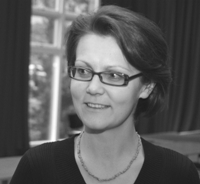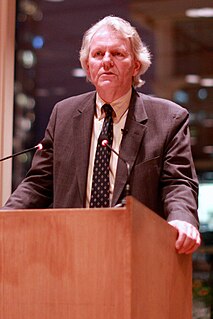The Centre for the Study of Democracy (CSD) is a multidisciplinary policy studies research organization which enhances the study of democracy both within Canada and abroad. Founded in the mid-1990s, CSD is a non-profit, non-partisan organization affiliated with the School of Policy Studies at Queen's University, in Kingston, Ontario, Canada. CSD is chaired by Dr. Thomas Axworthy, Principal Secretary and Chief Speechwriter for Prime Minister Pierre Trudeau in the early 1980s.
The CSD operates on the principle that building local knowledge of democratization and good governance is the most effective means of allowing countries undergoing democratic transitions to successfully manage this change over the long term, as well as being able to effectively respond to crises. CSD works extensively with local partners to provide both the pedagogical experience expertise and practical experience necessary to assist in the development of local democratic values programs as well as providing contacts to others who have succeeded in similar efforts.
The CSD focuses on research, mutual learning and executive development programming, designed to increase indigenous capacity to produce, debate and disseminate research about democracy.
The CSD is guided by three principles: to work jointly with individuals or institutions abroad on research projects of mutual interest that contributes to democratic governance, to commit to local partners to establish democratic capacity (a process which often takes years), and to use this experience to teach the lessons learned to other countries.
The CSD was founded by Dr. George Perlin, Professor Emeritus in the School of Policy Studies at Queen's University at Kingston, who specializes in the study of Ukraine. He initiated one of the most extensive project undertaken by the Centre, which involved the development of a Democratic Values Curriculum in Ukraine, the Canada-Ukraine Democracy Education Project, which is ongoing.
The Centre also organizes numerous events at Queen's University, regularly hosting guest lectures for the School of Policy Studies, and organizing periodic conferences on topics of interest. Conferences organized by the Centre have included:
A think tank, or policy institute, is a research institute that performs research and advocacy concerning topics such as social policy, political strategy, economics, military, technology, and culture. Most think tanks are non-governmental organizations, but some are semi-autonomous agencies within government or are associated with particular political parties or businesses. Think-tank funding often includes a combination of millionaire donations and individual contributions, with many also accepting government grants.

TheUniversity of Winnipeg is a public research university in Winnipeg, Manitoba, Canada, that offers undergraduate faculties of art, business and economics, education, science and kinesiology and applied health as well as graduate programs. UWinnipeg's founding colleges were Manitoba College and Wesley College, which merged to form United College in 1938. The University of Winnipeg was established in 1967 when United College received its charter. The governance was modeled on the provincial University of Toronto Act of 1906 which established a bicameral system of university government consisting of a senate (faculty), responsible for academic policy, and a board of governors (citizens) exercising exclusive control over financial policy and having formal authority in all other matters. The president, appointed by the board, was a link between the bodies to perform institutional leadership.

Matthew Mendelsohn is a Canadian public policy expert and public sector executive, best known for leading Prime Minister’s Justin Trudeau’s Results & Delivery Unit and the Government of Canada’s Impact & Innovation Unit from 2016-2020. These followed his role as a chief architect of the Liberals’ 2015 election platform and serving as a member of incoming Prime Minister Trudeau’s transition team, helping with cabinet selection and penning open and public Ministerial mandate letters.

The University of Erfurt is a public university located in Erfurt, the capital city of the German state of Thuringia. It was founded in 1379, and closed in 1816. It was re-established in 1994, three years after German reunification. Therefore it claims to be both the oldest and youngest university in Germany. The institution identifies itself as a reform university, due to its most famous alumnus Martin Luther, the instigator of the Reformation, who studied there from 1501 to 1505. Today, the main foci centre on multidisciplinarity, internationality, and mentoring.
The Latin American Public Opinion Project (LAPOP) is a research institute specializing in the development, implementation, and analysis of public opinion surveys. Founded by Mitchell A. Seligson over two decades ago, its principal focus is on governance and democracy in Latin America. The AmericasBarometer is the best-known survey produced by LAPOP. It is the only survey of democratic public opinion and behaviour that covers the Americas. It measures democratic values and behaviours in the Americas using national probability samples of voting-age adults. Elizabeth Zechmeister is the director of LAPOP. Noam Lupu is associate director of LAPOP.
Thomas Sidney Axworthy, is a Canadian civil servant, political strategist, writer and professor. He is best known for having served as Principal Secretary and Chief Speechwriter to Canadian Prime Minister Pierre Trudeau. Axworthy is currently the Secretary General of the InterAction Council. Previously, he was President and CEO of the Walter and Duncan Gordan Foundation. He is a senior fellow at the Munk School of Global Affairs, Massey College, and the Bill Graham Centre of Contemporary International History, Trinity College, at the University of Toronto.
René Lemarchand is a French-American political scientist who is known for his research on ethnic conflict and genocide in Rwanda, Burundi and Darfur. Publishing in both English and French, he is particularly known for his work on the concept of clientelism. He is a Professor Emeritus at the University of Florida, and continues to write, teach internationally and consult. Since retiring he has worked for US AID out of Abidjan as a Regional Consultant for West Africa in Governance and Democracy, and as Democracy and Governance advisor to USAID / Ghana.

Laura DeNardis is an American author and a globally recognized scholar of Internet governance and technical infrastructure. She is a tenured Professor and the Interim Dean in the School of Communication at American University. DeNardis is an affiliated Fellow of the Yale Information Society Project at Yale Law School and served as its Executive Director from 2008-2011. She previously served as a Senior Fellow of the Centre for International Governance Innovation (CIGI) and the Director of Research for the Global Commission on Internet Governance. With a background in information technology engineering and a doctorate in Science and Technology Studies (STS), her research studies the social and political implications of Internet technical architecture and governance. Domestically, she served as an appointed member of the U.S. Department of State Advisory Committee on International Communications and Information Policy (ACICIP) during the Obama Administration. She has more than two decades of experience as an expert consultant in Internet Governance to Fortune 500 companies, foundations, and government agencies.
Taras Kuzio is a British academic and expert in Ukrainian political, economic and security affairs. In 2010 he predicted the Russian annexation of Crimea that would result from the ousting of President Yanukovych. He has British citizenship, but is based in Toronto, Canada.

Elena Korosteleva is an academic researcher and principal investigator focusing on democratisation and the politics of Europe. She is an expert on the politics of Belarus, Ukraine and Moldova; as well as academic expert on the European External Action Service (EEAS), European Neighbourhood Policy (ENP) and Eastern Partnership (EaP). Korosteleva holds doctoral degrees from the University of Bath and the Belarusian State University Minsk and was previously British Academy postdoctoral research fellow at Glasgow University.
Daniel Drache is a scholar in Canadian and international political economy, globalization studies, communication studies, and cultural studies. He is recognized as having made important contributions to comparative and interdisciplinary debates on policy, globalization, border security, and the impact of new information and communication technologies on political mobilization and citizenship. He is also known for his critique of market fundamentalism. In Canada he is also credited with reviving the work of foundational political economist Harold Innis within the academy. Drache is a professor emeritus political science and senior research scholar of the Robarts Centre for Canadian Studies at York University in Toronto, Canada.

Thomas O. Melia currently serves as Washington Director at PEN America. Previously, he served in the Obama Administration as USAID's Assistant Administrator for Europe and Eurasia and as Deputy Assistant Secretary of State in the Bureau of Democracy, Human Rights and Labor, at the United States Department of State, where his portfolio included Europe, South and Central Asia, the Middle East, and international labor rights. Melia previously served as Executive Director of Democracy International, an organization that designs, implements, and evaluates democracy and governance programs around the world. Melia also served as the Deputy Executive Director of Freedom House, the centrist bipartisan human rights organization launched in 1941 by Eleanor Roosevelt and others.
The International Centre for Policy Studies (ICPS) is an independent NGO, founded in 1994 which aims to promote public policy concepts and practice and apply them to influential policy research that affects both the public and private sectors in Ukraine.
Peter Charles Aucoin, was a professor emeritus of political science and public administration at Dalhousie University in Halifax, Canada. He is recognized as one of the leading theorists on the practice and reform of public administration and governance. He was a fellow of the Royal Society of Canada and a member of the Order of Canada. He also served as an advisor to the Government of Canada as well as provincial and municipal governments.

The Balsillie School of International Affairs (BSIA) is a centre for advanced research and teaching on global governance and international public policy, located in Waterloo, Ontario. As one of the largest social sciences initiatives in Canada, the school is a collaborative partnership between the University of Waterloo, Wilfrid Laurier University, and the Centre for International Governance Innovation. The BSIA is housed in the north and west wings of the CIGI Campus. Admission to BSIA is highly selective.

Michael J. Prince is a Canadian political scientist and public policy and administration scholar. Prince is the Lansdowne Professor of Social Policy at the University of Victoria in Canada.
Sujit Choudhry is a lawyer, legal scholar, and expert in comparative constitutional law.
Malcolm Peat, MBE was a Canadian academic. He was a Professor Emeritus of Queen's University. He was a pioneer in the development of Physical Therapy and Rehabilitation academically in Canada and was responsible for the design, development, implementation and evaluation of disability and rehabilitation practices throughout the world. He was the first Canadian physical therapist to obtain a doctoral qualification and to assume Directorship of a Canadian university school of rehabilitation, and the first to develop and implement university graduate studies in Rehabilitation in Canada.

Patrizia Nanz is a political scientist and an expert for public participation and democratic innovations. She is a professor of transformative sustainability studies at the University of Potsdam, and one of three scientific directors at the Institute for Advanced Sustainability Studies (IASS).

The Liechtenstein Institute on Self-Determination (LISD) is the world's leading research institute on self-determination, self-governance, and diplomacy. LISD is affiliated with the Princeton School of Public and International Affairs at Princeton University. Founded in 2000 by the Prince Hans-Adam II of Liechtenstein, the Institute aims to enhance global peace and stability through its projects, publications, and commentaries.